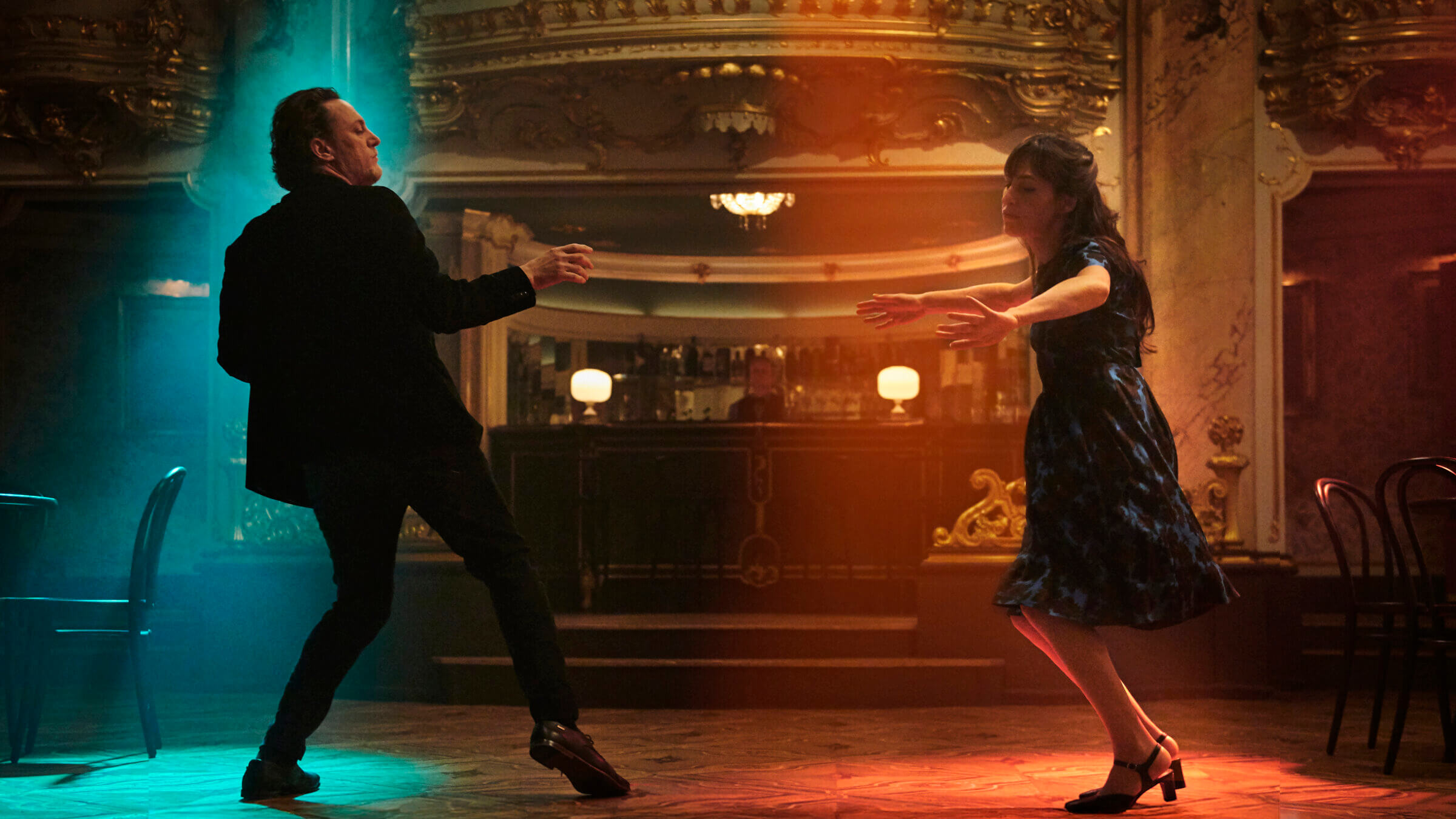In a film from Israel, three characters in search of a love language
Expanded from an Oscar-nominated Israeli short, ‘Dead Language’ goes deeper into our failures to communicate

Sarah Adler and Yehezkel Lazarov in Dead Language. Photo by Julie Vrabelova
Sometimes a film states its thesis in song
Aftersun used “Under Pressure” in an ecstatic, cathartic burst to tell us we were witnessing “the last dance” of a father and his daughter. In A Serious Man, the trite Jefferson Airplane hit “Somebody to Love.” warned about hope dying and truth coming to lies, underscoring the indignities of Larry Gopnik, whose humdrum Midwestern life unravels in Jobsian fashion.
Dead Language, a new film about what goes unspoken in our deepest and our most fleeting encounters, features a climactic dance scene to Depeche Mode’s new wave maxim: “Words are very unnecessary — they can only do harm.” And so the characters don’t speak in that moment, they let their bodies do the talking.
Expanded from the 2015 Oscar-nominated short, Aya, by married Israeli director-writers Mihal Brezis and Oded Binnun, the first 20 minutes of the film are familiar, as is the cast.
Sarah Adler reprises her role as Aya, who we meet waiting at arrivals at Ben Gurion Airport. A car service driver asks her to hold his place and the name sign of his passenger. On a whim, she ends up taking his fare, a stoic Dane played, as in the short, by Ulrich Thomsen.
Here, and in other details, Dead Language — with dialogue in English, Czech and Hebrew — departs. There’s still the reveal that Aya is a married woman (she was meant to pick up her husband before she chauffeured the stranger), but the simplicity of the short film, which makes a case for music as a universal language, has a grander statement about the insufficiency of language, which the filmmakers say was the original, feature-length concept.
Embodying the idea is Thomsen’s character, Esben — Overby in the short film — now a lighting designer who has come to Jerusalem to illuminate Solomon’s Quarries under the Old City. On the way to his hotel, he inspires Aya to take a detour to a Trappist Monastery where the monks have taken a vow of silence (his outgoing voicemail quips that “silence is golden”).
At home, Aya’s postdoc husband Aviad (Yehezkel Lazarov) is a recently-published linguist devoted to preserving dead languages and recovering the voices of the past. Though they speak the same first language, the couple have a failure to communicate. Whatever spark there was is fizzling and, after her encounter with Ebsen, Aya turns to strangers she finds at the club or even in Ebsen’s old hotel room to recapture the feeling.
Her day job, as a telemarketer selling digital currency, speaks to the quirks of connection. The office is pushing predictive modeling from Artificial Intelligence. The algorithm’s supposedly precise understanding of behavior, we divine, can’t control for something more essential — the unpredictability that comes with being human and what is conveyed wordlessly.
Many of the characters in Brezis and Binnum’s story converse in lingua francas, perhaps a truer and more unfiltered mode of communication than a native tongue. In the end these people scramble for a love language that is mutually intelligible, often tacit, always on less familiar terms.
Rewatching the short, there are hints of the new direction. Thomsen’s character, at one point says “quite often when we’re so eager to say something it turns out to be completely unnecessary, like most of our impulses.”
Read differently, this could be a critique of giving the story a feature-length treatment, when the original, while a proof of concept for a longer film, had the understated elegance of Hemingway’s “Hills Like White Elephants” — do we need to follow the characters into the doctor’s office? Or Aya into the places where words fail her?
But Dead Language has something new to say, even if the added metaphor of Esben lighting deep chasms — and Guy Sahaf’s chiaroscuro cinematography that decides what to reveal and what to keep hidden — may be too much.
Brezis and Binnum have tapped into an alienation that is as modern as it is eternal, dating back to Babel, when our tongues became scrambled, creating the need for common languages that speak louder than words and penetrate deeper.
“Words are trivial, pleasures remains,” Depeche Mode insisted, through a sonic wall of synthesizers, “so does the pain.”
The film Dead Language debuted at the Tribeca Film Festival June 9. More information and screenings can be found here.

















